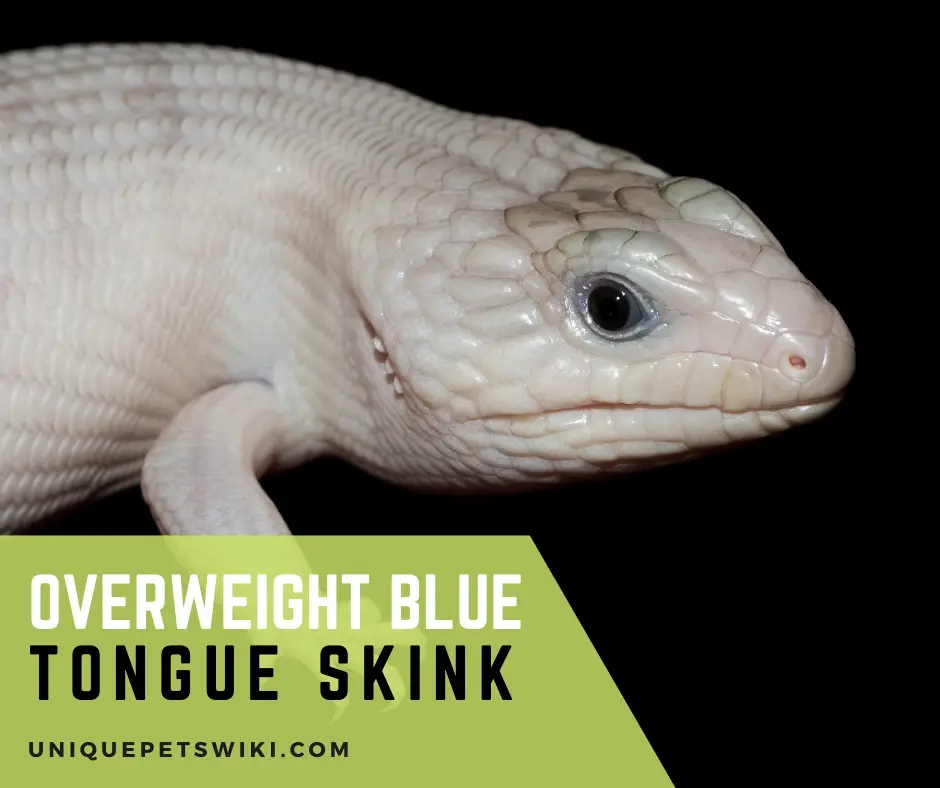Blue-tongued skinks are a popular reptile that you can keep as a pet as they are docile and can be easily tamed. Caring for them is quite easy, making them a suitable pet for beginners and kids.
However, they are a large lizard species, and it may be quite hard to determine when they are overweight as a beginner hobbyist.
One of the common health problems that blue tongue skink face is obesity as they eat most of the things offered to them.
You can determine that your blue tongue skink is overweight if it has a disproportionate appearance, as most healthy BTS have a streamlined and proportionate body.
As a responsible blue tongue skink owner, you may wonder if your blue tongue skink is overweight. We got you covered, as this article will help highlight everything you need to know about overweight blue tongue skink.
Contents
How Big Should a Blue Tongue Skink Is?
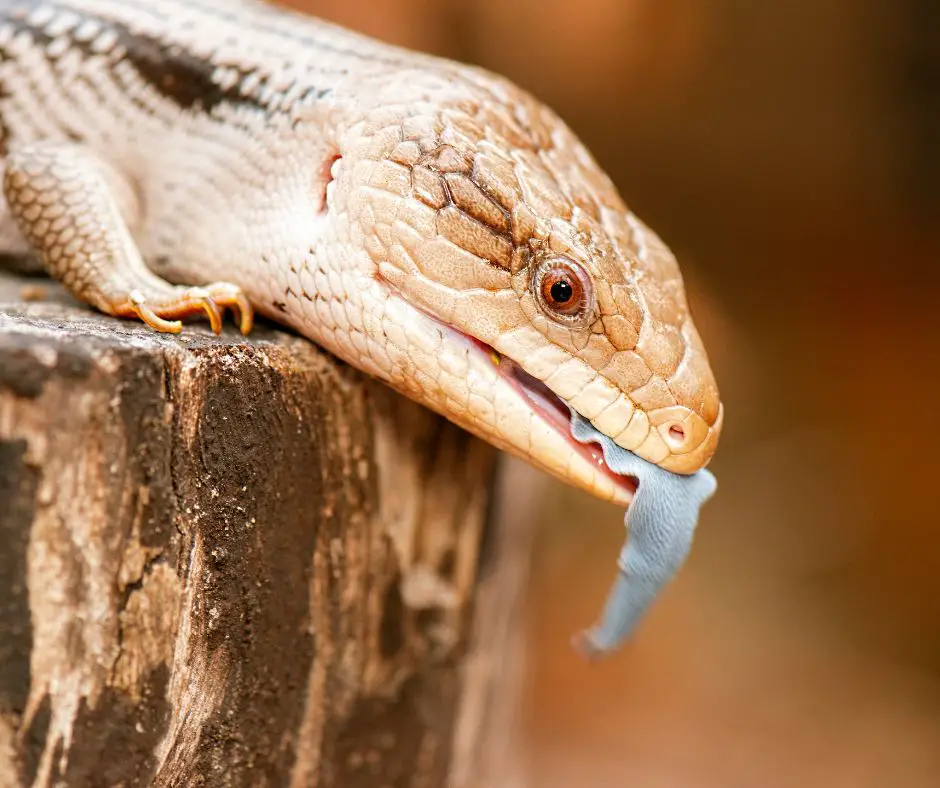
Blue-tongued skinks are large lizard species, and they can grow to about 18-24 inches and weigh 10-18 ounces.
The largest blue tongue skink is 27 inches long, while the smallest is 14 inches long. Therefore, blue tongue skinks are chunky and have a sausage-like appearance.
A healthy and well-fed BTS usually has a relatively streamlined and proportionate body. However, you can determine that your blue tongue skink is overweight if it is heavier or has a disproportionate body.
Signs of Overweight Blue Tongue Skink
Symptoms of obesity in blue tongue skink usually vary from one lizard to another. However, some of the common signs that you can use to determine if your blue tongue skink is overweight apart from its weight are stated below:
- Your BTS legs appear too small for their body.
- Lethargy or reduced activity, for instance, when an active BTS suddenly becomes less active and uninterested.
- Your blue tongue skink is breathing heavily.
- The head of your BTS appears too small for its body.
- There is lots of excess flesh under your blue tongue skink’s chin.
Distinguish Between a Fat and Pregnant Blue Tongue Skink
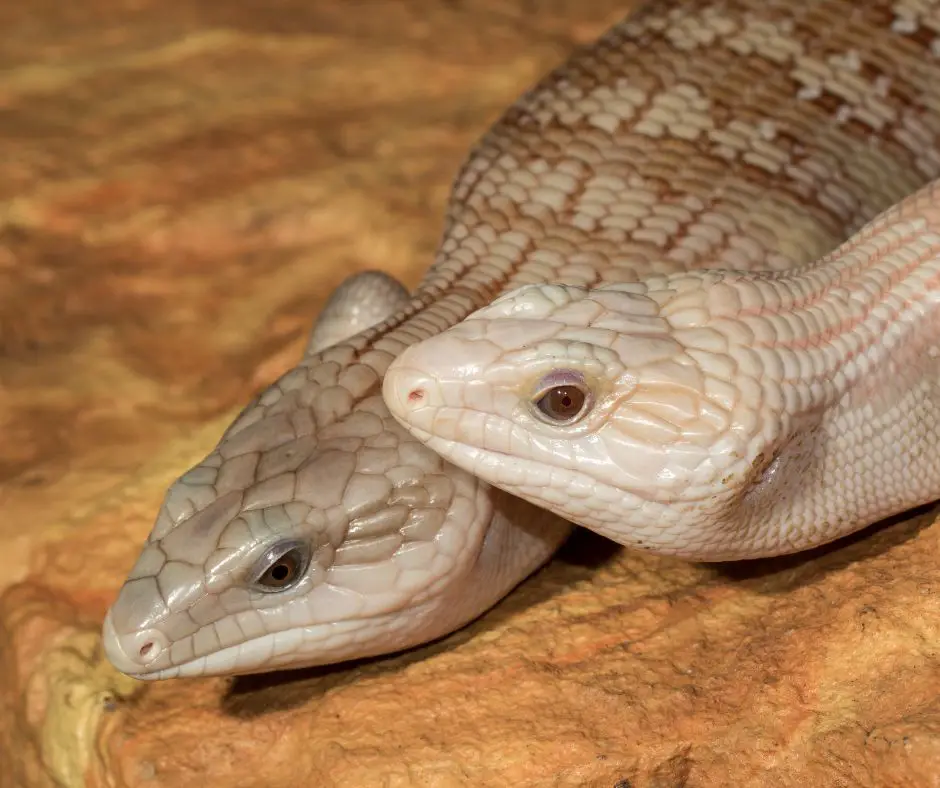
It can be quite hard to determine whether a female blue tongue skink is overweight or pregnant if you don’t know the skink’s history.
The general signs that a female blue tongue skink is overweight are if it has a disproportionate body, the presence of facial fat on its jaws, or if its legs or head looks smaller than the body.
On the other hand, you will need to be on the lookout for some other signs apart from being overweight to determine if a female blue tongue skink is pregnant. Some of the signs are:
- The female blue tongue skink is breathing heavier than before.
- Your blue tongue skink is not eating as she should.
- Displaying defensive behavior as it gets closer to her gestation period.
Note: A pregnant blue tongue skink can display more than one sign when pregnant.
Why Is Your Blue Tongue Skink Overweight?
There are several reasons for a blue tongue skink to be overweight. Some of them are stated below.
Overfeeding
One of the common causes of obesity in blue tongue skinks is overfeeding. Blue-tongued skinks are voracious eaters and are happy to eat anything you offer them. Overfeeding your blue tongue skinks can then lead to obesity in your blue tongue skinks.
Therefore, it is recommended that you feed young skinks daily and adult skinks once or twice per week.
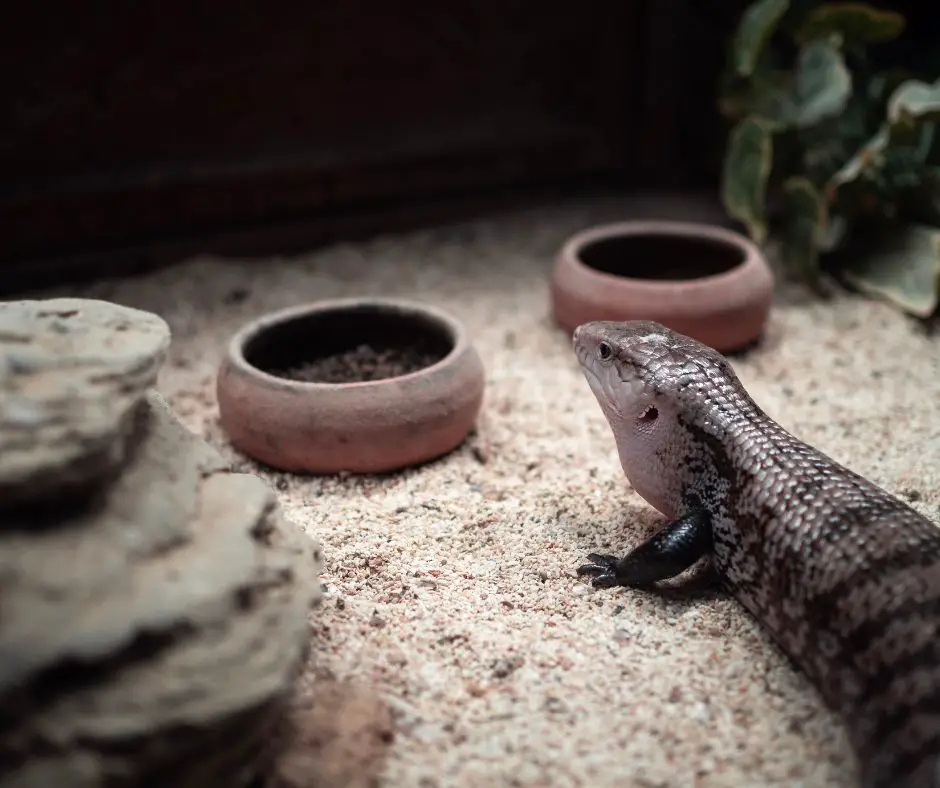
Not Feeding Them With Enough Vegetables.
Generally, a blue tongue skink requires 50% vegetables in their diet. Therefore, not feeding your skink enough vegetables can cause health problems like obesity as they will not get enough nutrients.
Not Providing Your Skinks With a Variety of Feeder Insects
Blue tongue skinks require 40% protein in their diet, and they get this nutrient from feeder insects.
However, your blue tongue skink can become overweight if you are not feeding them with various feeder insects. For instance, feeding your skinks with insects like hornworms, waxworms, or pinky mice will make them obese.
You should only feed them with fattier feeders occasionally and also add feeders like crickets, locusts, and lean meat into their diet.
Not Enough Exercise
It is also possible for blue tongue skinks to get overweight if it is not getting enough exercise. For instance, a skink will not have enough space to explore and move around if you house it in a small enclosure.
Low Temperatures
Another reason a blue tongue skink becomes overweight is if you are housing it in an enclosure with a low temperature. This is because blue tongue skinks are cold-blooded animals and require enough heat to digest their food.
However, housing them in an enclosure with low temperature means they cannot process their calories properly, causing weight gain.
Aiicioo Under Tank Heater Thermostat
- COMBO SET - Packed with digital thermostat and under tank heater. Reptile under tank heat pad provides your reptile gentle and constant warm 24 hours, and monitors and control the temperature all the time.
- UPGRADED VERSION - Upgraded adhesive material of under tank heat pad is more solid than similar products in the market. It effectively decreases and eradicates the probability of melting and separating.
- MOUNTING - Reptile heat mat with thermostat optional mounting on bottom or side of your terrarium. Rubber feet enclosed for bottom mounting to slight elevate terrarium and allow excess heat to escape. (IMPORTANT)
- SIMPLY SET UP - Heat mat thermostat simply set the temperature probe, plug-in the controller, and use the large 3-button interface to choose your desired temperature setting. Digital display of seedling heat mat thermostat available in Fahrenheit and Celsius.
- SPECIFICATIONS - Hermit Crab Heater Size: 8” x 6” ; Voltage: 120 volt; Power: 8 watt; Temperature control range is 68-108°F, Digital Reptile Thermostat temperature display range is 32 -140°F.
Last update on 2022-12-29 / Affiliate links / Images from Amazon Product Advertising API
How Do You Help Blue Tongue Skinks Lose Weight?
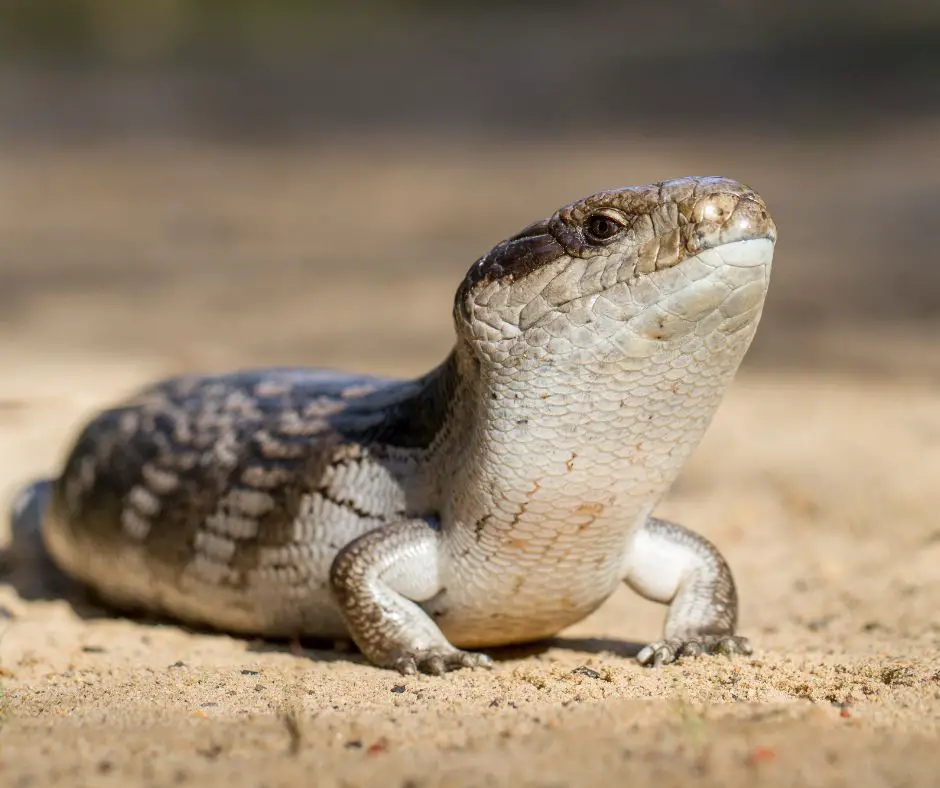
The first thing that you can do when helping your blue tongue skink to lose weight checks their husbandry.
You should determine whether you are overfeeding them, if the temperature is too low, or if their enclosure is too small. You can then correct it as needed.
Some of the ways that you can help your blue tongue skink to lose weight are stated before:
- Reduce the frequency and the portion size of food you feed your BTS.
- Add more vegetables into their diet and reduce treat.
- Encourage exercise by housing them in a larger enclosure and taking your skink outside their cage to explore around.
- Weigh your skink once a week with a kitchen scale to determine if there is progress.
Note: you may need to consult with your exotic vet if your blue tongue skink is still overweight after a month to help check for any underlying medical condition.
Prevent Overweight Blue Tongue Skinks
According to general sayings, prevention is better than cure, so you should try to prevent your blue tongue skinks from getting overweight right from the start. Here are some helpful tips that you can follow to prevent your blue tongue skinks from becoming overweight.
- Ensure you feed your blue tongue skinks with a balanced diet.
- Have a diet schedule for your skink; young and juvenile skinks should be fed daily, while adult skinks should be fed once or twice per week.
- Encourage your skink to exercise by taking them out of their tank regularly.
- Only feed your blue tongue skink with fatty feeders like pinky mice, hornworms, etc.
What About Blue Tongue Skink Underweight?
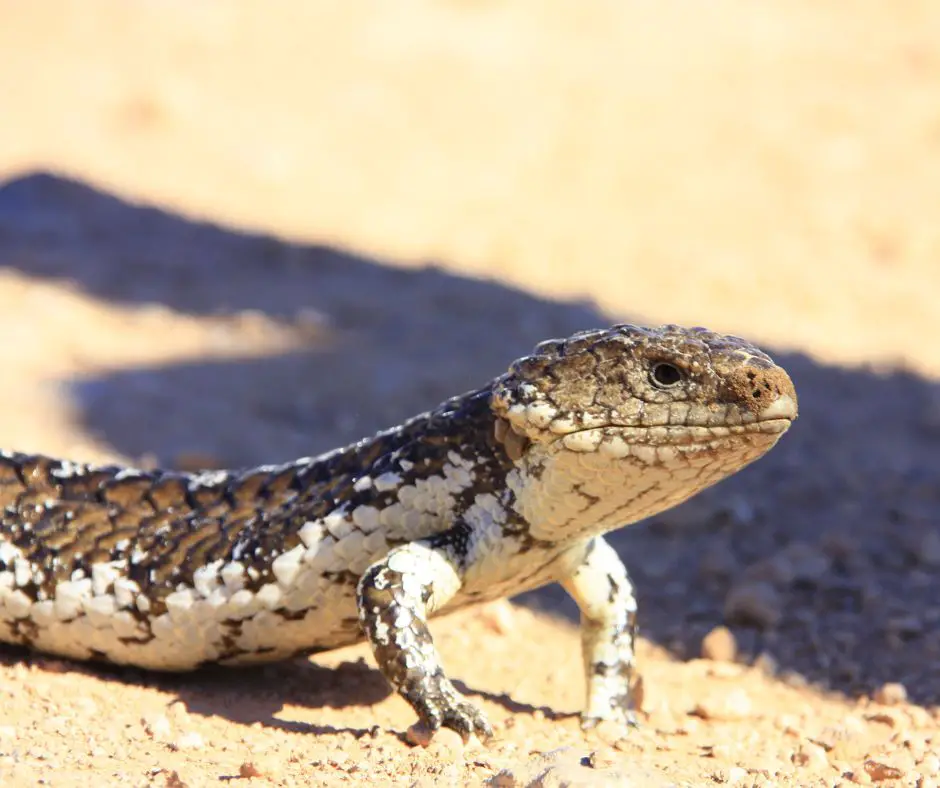
Generally, it is more common for a blue tongue skink to be overweight than underweight. This is because BTS skinks will keep on eating whenever you feed them, leading to obesity and sickness. However, blue tongue skinks can also become underweight.
This can happen if your blue tongue skink is not eating enough food or not eating at all. Some of the signs that you can use to determine that your skink is underweight are:
- The bone of your skink is sticking out, and you can easily see it.
- Your skink looks thin when compared to other skinks of its age.
When treating a blue tongue skink that is underweight, the main thing to be concerned about is how you can help it survive. The first thing that you can try is to encourage your blue tongue skink to eat.
You can encourage your BTS to eat more by giving it sugary food with high glucose content like fruits to help boost their energy level.
Zoo Med Food Crumbles for Blue Tongue Skink 8 oz (690949)
- Carefully formulated by nutritionists to be a balanced diet to meet the nutritional needs of Blue tongue skinks for proper growth and development.
- Contains Chopped grasses (timothy, alfalfa) to provide long-stem fiber, An important part of their natural diet.
- Contains small amounts of fruit (mango) and animal protein (Black Soldier fly Larvae) to meet there unique dietary requirements.
- Contains flavorful dandelion greens, Yucca and other plants that Blue tongue skinks love.
- Can be mixed with zoo menu canned Blue tongue skink and Tegu Food and zoo Meds can O’ insect line to add variety to their diet.
Last update on 2022-12-29 / Affiliate links / Images from Amazon Product Advertising API
You can then incorporate slower energy-releasing food like protein, egg, or meat into your diet for body growth. Once your skinks start eating more, you can reduce the sugary food to an occasional treat.
If your underweight blue tongue skink is a picky eater and is only eating one food like pinky mice. You can offer it to the mice with a couple of healthier food choices.
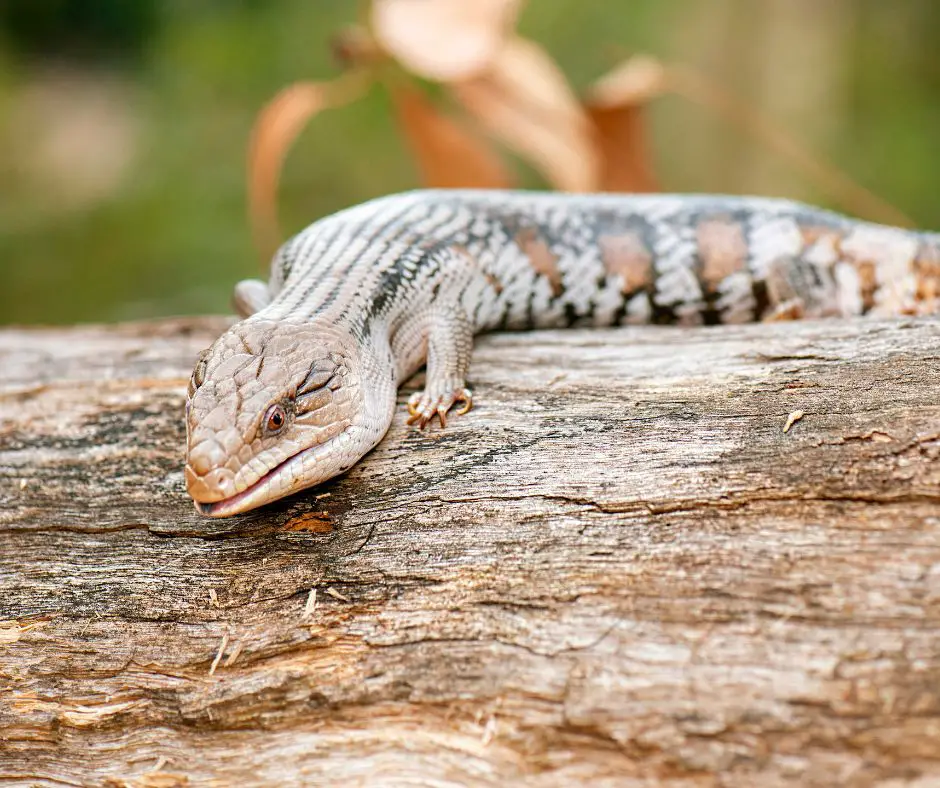
The skink may not eat at first but will want to try it out at some point, and once it tries, you can increase the healthier food choice and reduce the pinky mice you will offer.
There is a situation where a blue tongue skink is underweight but is not eating at all. The best thing to hope for is that your skink is drinking.
If that is the case, you can entice them by mixing minced dog or cat food into the water to help boost their energy.
You can then provide a second water dish to help encourage them to eat.
If your skink is not eating, you may need to resort to force-feeding your blue tongue skink. This is because your skink is already at a critical stage. However, it is not recommended that you try this as a first-time owner because it can be dangerous to your skink.
You can consult with the vet as soon as possible for treatment.
Final Sentences
Generally, caring for a blue tongue skink is quite easy and rewarding. They are voracious eaters and can eat most of the things offered to them. However, your blue tongue skink can become overweight if you don’t feed them a balanced and healthy diet.
We hope this article helps shed light on why your blue tongue skink is overweight and how to solve this problem. You can message us in the comment section below if you have experienced an overweight problem in your blue tongue skink or if you just have a question.
